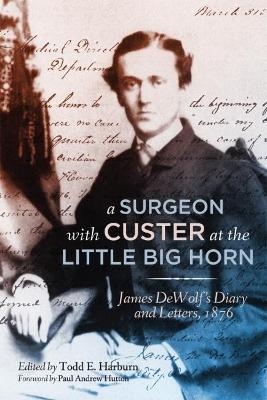
A Surgeon with Custer at the Little Big Horn
James DeWolf's Diary and Letters, 1876
Seiten
2019
University of Oklahoma Press (Verlag)
978-0-8061-6310-9 (ISBN)
University of Oklahoma Press (Verlag)
978-0-8061-6310-9 (ISBN)
In 1876 James Madison DeWolf accepted the assignment of contract surgeon for the Seventh Cavalry. Killed in the early stages of the Battle of Little Big Horn, he left behind an eyewitness account in his diary and correspondence. This is the first annotated edition of these rare accounts since 1958, and the most complete treatment to date.
In spring 1876 a physician named James Madison DeWolf accepted the assignment of contract surgeon for the Seventh Cavalry, becoming one of three surgeons who accompanied Custer's battalion at the Battle of the Little Big Horn. Killed in the early stages of the battle, he might easily have become a mere footnote in the many chronicles of this epic campaign - but he left behind an eyewitness account in his diary and correspondence. A Surgeon with Custer at the Little Big Horn is the first annotated edition of these rare accounts since 1958, and the most complete treatment to date.
While researchers have known of DeWolf's diary for many years, few details have surfaced about the man himself. In A Surgeon with Custer at the Little Big Horn, Todd E. Harburn bridges this gap, providing a detailed biography of DeWolf as well as extensive editorial insight into his writings. As one of the most highly educated men who traveled with Custer, the surgeon was well equipped to compose articulate descriptions of the 1876 campaign against the Indians, a fateful journey that began for him at Fort Lincoln, Dakota Territory, and ended on the battlefield in eastern Montana Territory. In letters to his beloved wife, Fannie, and in diary entries - reproduced in this volume exactly as he wrote them - DeWolf describes the terrain, weather conditions, and medical needs that he and his companions encountered along the way.
After DeWolf's death, his colleague Dr. Henry Porter, who survived the conflict, retrieved his diary and sent it to DeWolf's widow. Later, the DeWolf family donated it to the Little Bighorn Battlefield National Monument. Now available in this accessible and fully annotated format, the diary, along with the DeWolf's personal correspondence, serves as a unique primary resource for information about the Little Big Horn campaign and medical practices on the western frontier.
In spring 1876 a physician named James Madison DeWolf accepted the assignment of contract surgeon for the Seventh Cavalry, becoming one of three surgeons who accompanied Custer's battalion at the Battle of the Little Big Horn. Killed in the early stages of the battle, he might easily have become a mere footnote in the many chronicles of this epic campaign - but he left behind an eyewitness account in his diary and correspondence. A Surgeon with Custer at the Little Big Horn is the first annotated edition of these rare accounts since 1958, and the most complete treatment to date.
While researchers have known of DeWolf's diary for many years, few details have surfaced about the man himself. In A Surgeon with Custer at the Little Big Horn, Todd E. Harburn bridges this gap, providing a detailed biography of DeWolf as well as extensive editorial insight into his writings. As one of the most highly educated men who traveled with Custer, the surgeon was well equipped to compose articulate descriptions of the 1876 campaign against the Indians, a fateful journey that began for him at Fort Lincoln, Dakota Territory, and ended on the battlefield in eastern Montana Territory. In letters to his beloved wife, Fannie, and in diary entries - reproduced in this volume exactly as he wrote them - DeWolf describes the terrain, weather conditions, and medical needs that he and his companions encountered along the way.
After DeWolf's death, his colleague Dr. Henry Porter, who survived the conflict, retrieved his diary and sent it to DeWolf's widow. Later, the DeWolf family donated it to the Little Bighorn Battlefield National Monument. Now available in this accessible and fully annotated format, the diary, along with the DeWolf's personal correspondence, serves as a unique primary resource for information about the Little Big Horn campaign and medical practices on the western frontier.
Todd E. Harburn, an independent scholar, orthopedic surgeon, and doctor of sports medicine, is coauthor of A Most Troublesome Situation: The British Military and the Pontiac Indian Uprising of 1763-1764. Harburn and his wife, Shirley, reside at the Straits of Mackinac, Michigan. Paul Andrew Hutton is Distinguished Professor of History at the University of New Mexico and author of Soldiers West: Biographies from the Military Frontier and numerous other books and articles.
| Erscheinungsdatum | 05.11.2018 |
|---|---|
| Vorwort | Paul Andrew Hutton |
| Zusatzinfo | 40 black & white illustrations, 2 maps |
| Verlagsort | Oklahoma |
| Sprache | englisch |
| Maße | 152 x 229 mm |
| Gewicht | 426 g |
| Themenwelt | Literatur ► Biografien / Erfahrungsberichte |
| Sachbuch/Ratgeber ► Geschichte / Politik | |
| Sachbuch/Ratgeber ► Natur / Technik | |
| Geisteswissenschaften ► Geschichte ► Regional- / Ländergeschichte | |
| Medizin / Pharmazie ► Allgemeines / Lexika | |
| Medizin / Pharmazie ► Medizinische Fachgebiete ► Medizinethik | |
| Sozialwissenschaften ► Politik / Verwaltung ► Staat / Verwaltung | |
| ISBN-10 | 0-8061-6310-0 / 0806163100 |
| ISBN-13 | 978-0-8061-6310-9 / 9780806163109 |
| Zustand | Neuware |
| Haben Sie eine Frage zum Produkt? |
Mehr entdecken
aus dem Bereich
aus dem Bereich
Erinnerungen
Buch | Softcover (2024)
Pantheon (Verlag)
16,00 €
Universalgelehrter, Polarreisender, Entdecker
Buch | Hardcover (2024)
mareverlag
28,00 €


